|
第2回イスラムメディア会議
The Second International Conference on Islamic Media |
2011年12月12日~12月15日
於:Golden Ballroom, Hotel Sultan Jakarta |
| << 1 | 2 >> |
| 12月15日午後2時~3時第2回イスラムメディア会議の閉会式が、ずっと会議をつづけてきたHotel Sultan, Golden Ballroomの間で開催された。 |
| クルアーン読誦に続き、今会議の決議文が披露された。内容は以下の通り。 |
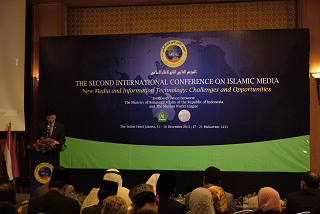 |
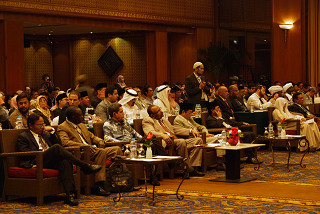 |
| 決議文の発表 |
決議文の発表に聞き入る参加者たち。座席は満席の状態だ。 |
|
|
الحمد لله رب العالمين، والصلاة والسلام على نبينا محمد خاتم الأنبياء والمرسلين، وعلى آله وصحبه أجمعين، وبعد:
فبتوفيق من الله وعون، اختتم المؤتمر العالمي الثاني للإعلام الإسلامي أعماله في جاكرتا ، تحت عنوان: (تأثير الإعلام الجديد وتقنية الاتصالات على العالم الإسلامي - الفرص والتحديات).
وذلك برعاية فخامة الرئيس سوسيلو بامبنج هو يونو رئيس جمهورية إندونيسيا.
وقد عقدته رابطة العالم الإسلامي بالتعاون مع وزارة الأوقاف والشؤون الدينية الإندونيسية في الفترة من 18ـ20/1/1433هـ الموافق لـ 13ـ15/12/2011م.
وذلك تواصلاً مع المؤتمر العالمي الأول للإعلام الإسلامي، الذي عقدته الرابطة في جاكرتا عام 1400هـ ، الموافق 1980م .
وقد كان انعقاده تقديراً لمتطلبات المرحلة الدقيقة التي تعيشها الأمة، وما يمكن أن تقوم به وسائل الإعلام من مهمات على مختلف المستويات، وتأكيداً لأهمية تنسيق جهود القائمين على الإعلام الإسلامي، وتبادل الخبرات والرؤى بينهم، وتحقيقاً لمتطلبات الارتقاء بالإعلام الإسلامي ورفع مستوى الوسائل الإعلامية لدى المسلمين والارتقاء بإنتاجية العمل فيها، ودعماً للجهود المبذولة في الدفاع عن الإسلام ومواجهة الحملات الظالمة، وتصحيح الصورة المغلوطة التي يروجها الأعداء عن دين الله، وتعزيزاً للحوار العالمي الذي دعا إليه خادم الحرمين الشريفين الملك عبد الله بن عبد لعزيز آل سعود.
وقد دعت الرابطة عدداً من القيادات الإعلامية ومسؤولي مؤسسات الإعلام الإسلامي، وأساتذة الجامعات المتخصصين في مجالات الإعلام لمناقشة موضوع المؤتمر، من خلال أبحاث وأوراق عمل ركزت على متغيرات العصر وناقشت مستجداته، وذلك من خلال المحاور الخمسة:
المحور الأول : الإعلام في العصر الحالي .. مكوناته وتأثيره .
المحور الثاني: العمل الإعلامي الإسلامي المشترك .
المحور الثالث: الخطاب الإعلامي الإسلامي .
المحور الرابع: الإعلام والحوار مع الآخر .
المحور الخامس: حلول عملية لتطوير الإعلام الإسلامي .
وفي افتتاح المؤتمر أكد المتحدثون على ما يلي :
1- أهمية العناية بالإعلام الإسلامي وخطابه الذي يكتسب شرفه من شرف الإسلام، وأن وظيفته عالمية مرتبطة بعالمية الرسالة الإسلامية، "وما أرسلناك إلا كافة للناس بشيراً ونذيرا".
2- الإعلام الإسلامي خطاب تواصل متجدد مع المجتمعات الإسلامية والإنسانية، يعنى بمتغيرات العصر، ويهدف إلى الإصلاح (إِنْ أُرِيدُ إِلَّا الْإِصْلَاحَ مَا اسْتَطَعْتُ) .
3- الإعلام الإسلامي يتميز بسمات الوسطية والموضوعية والواقعية والعمق والبعد عن أساليب الانفعال والارتجال، ويتلاءم مع مهمة الأمة الإسلامية، أمة الوسط (وَكَذَلِكَ جَعَلْنَاكُمْ أُمَّةً وَسَطًا لِتَكُونُوا شُهَدَاءَ عَلَى النَّاسِ وَيَكُونَ الرَّسُولُ عَلَيْكُمْ شَهِيدًا) .
4- للإعلام الإسلامي مهمات عديدة في مقدمتها نصرة قضايا الأمة والدفاع عنها، وجمع كلمة المسلمين، وتوظيف الرصيد العظيم من القيم الإنسانية والحضارية في الإسلام لتحقيق البنية الإسلامية المتميزة، وإيجاد تكامل حقيقي بين شعوب الأمة: (وَاعْتَصِمُوا بِحَبْلِ اللَّهِ جَمِيعًا وَلَا تَفَرَّقُوا) .
وخلال جلسات المؤتمر التي حفلت بنقاش مستفيض، واتُفق فيها على تعريف إجرائي بأن الإعلام الإسلامي يعني استخدام كافة وسائل الاتصال والإعلام في المجتمعات المسلمة لخدمة الإسلام والمسلمين ، تبين للمشاركين ما يلي :
1- أظهرت وسائل الإعلام الجديدة وتقنية الاتصالات قدرة كبيرة في خدمة قضايا المجتمع الإنساني وتطوره التنموي والعلمي، إذا ما تم توظيفها توظيفاً صحيحاً، مما يوجب على المسلمين أن يكونوا مشاركين مؤثرين في مجالات الإعلام والمعرفة، لئلا يظلوا تابعين لغيرهم، مستهلكين لسلعهم خاضعين لهيمنتهم الفكرية والثقافية وسيطرتهم الاقتصادية والسياسية .
2- الإعلام الجديد يسهم في أن يكون البناء المعرفي الإنساني مشتركاً، مما يؤدي بالبشرية إلى التفاهم الإنساني والتعاون البشري والسلم العالمي، غير أن كثيراً منه موظف لتعميق سوء الفهم بين البشر وتعزيز الكراهية والعصبيات.
وفي حال عدم استثمار تطور وسائل الإعلام بالشكل المطلوب فمن المتوقع أن تكون النتائج على المستوى الإنساني العام أكثر سوءاً من قبل، حيث يؤدي إلى الجهل والمزيد من الانقسام والتشرذم وتعميق العوالم الافتراضية التي تؤدي إلى الاصطدام في الواقع الاجتماعي .
3- من آثار عولمة النشاط الإعلامي وصناعة الإعلام عالمياً، ممارسة قوى السوق في كثير من مناطق العالم ضغوطاً لإعادة هيكلة وسائل الإعلام وإخضاعها لآليات السوق وتحويل المعرفة من خدمة إلى سلعة وتصنيعها وفق رغبات العامة وليس حسب احتياجاتهم، مما أدى في الغالب إلى هبوط بالمحتوى الإعلامي وبمستوى الالتزام القيمي والأخلاقي .
4- أدى تطور وسائل الاتصال إلى تعدد وسائل الإعلام وتجزئة الجمهور المتلقي ، مما أدى إلى فقدان قدرتها على تحقيق الإجماع وإشاعة معايير الجماعة وقيمها الاجتماعية والتعبير عن التيار العام في المجتمع والعمل في إطار التفاعل بين الجماعات.
وتوجهت في معظمها إلى الفردية والعمل بعيداً عن تأثير المؤسسات الاجتماعية ولو من قبيل النصح أو الإرشاد أو التصحيح.
5- حقق القطاع الإعلامي الخاص جماهيرية متزايدة على حساب الإعلام الرسمي الذي يعاني في كثير منه من ضعف الإدارة وتدني درجة الأداء المهني في الإنتاج والعرض .
6- قامت معاهد الإعلام وأقسامه في الجامعات بعمل إيجابي، غير أنها في معظمها لا تزال متأثرة بالمعايير المهنية للصحافة العالمية واعتماد معايير التصنيف في الأنظمة الإعلامية الأخرى وانتشار المفهوم الغربي لحريات الإعلام الذي يصيب البيئة الإعلامية في العالم الإسلامي بالكثير من الاضطراب ، مما يستدعي حث المفكرين والأكاديميين على بذل الجهد لتطوير نظام إعلامي يلائم المجتمع المسلم.
7- العمل الإعلامي الإسلامي المشترك ما يزال ينقصه التنسيق المطلوب والجهد العلمي والتنظيم ليصبح بإمكانه الدفاع عن قضايا المسلمين العادلة بلغة العصر، والنهوض بالأمة الإسلامية في أكثر الميادين أهمية وتأثيراً، ودحض افتراءات المغرضين، وإظهار مبادئ الإسلام وقيمه في العالم بصورتها الصحيحة .
توصيات المؤتمر
أهاب المؤتمر بحكومات الدول الإسلامية ومؤسسات الإعلام فيها والإعلاميين المسلمين ومؤسسات الدعوة والعمل الإسلامي أن تتعاون ضمن آليات عمل مشتركة للنهوض بالإعلام الإسلامي، ودعمه بما يحقق أهدافه ويحافظ على شرف مواثيقه، وينجز أهدافه الإسلامية والإنسانية، وأوصى بما يلي :
أولاً:
دعوة وسائل الإعلام في الأمة الإسلامية لمساندة جهود الحوار مع مختلف الثقافات وأتباع الديانات والحضارات ، ومد جسور التواصل معها وإيجاد البرامج التي تؤدي تلك المهمات، واستلهام المنهاج الإسلامي في التواصل والحوار مع غير المسلمين "قل يا أهل الكتاب تعالوا إلى كلمة سواء بيننا وبينكم".
ثانياً:
دعوة وسائل الإعلام في البلدان الإسلامية بخاصة، وفي دول العالم كافة ، إلى استثمار الطاقات الإعلامية السلمية المعروفة حديثاً بتعبير (القوة الناعمة) في التواصل مع الثقافات الأخرى، وتوظيفها وتنميتها ، للتفاهم في مجال السياسة الدولية وحل النزاعات بين الأمم والشعوب بالطرق السلمية.
ثالثاً:
مناشدة دول العالم كافة التصدي لكل ما من شأنه المساس بالرسالات الإلهية, والرسل عليهم الصلاة والسلام، وضبط حرية التعبير المؤدية إلى الانزلاق والتفسخ وإفساد أخلاق النشء بخاصة عبر وسائل الإعلام، وأن تكون عوناً للأسر والمدارس في هذا الميدان.
رابعاً:
إيجاد وسائل تحقق التنسيق بين المؤسسات الإعلامية في العالم الإسلامي، والاستفادة البينية بين دوله في تبادل الخبرات واستثمار ما تملكه بعض الدول الإسلامية من تكنولوجيا متقدمة في مجال الاتصال والمعلومات .
خامساً:
التذكير بأهمية الإعلام في ترسيخ قيم الأمن والتكامل في المجتمعات الإسلامية بين الجهات الرسمية والشعبية ، ودوره في مواجهة التطرف والغلو والفتن والإرهاب .
سادساً:
حث الجمعيات والمراكز الإسلامية ووسائل الإعلام على الاستفادة المنضبطة بضوابط الشرع من شبكات التواصل الاجتماعي وفق خطط مدروسة باعتبارها فرصة للتفاعل والتشارك ولزيادة جهود العمل الدعوي والخيري والطوعي .
سابعاً:
إنشاء مراكز ومعاهد للتدريب تركز على الجانب العملي والتطبيقي، مع أهمية مراعاة التقدم التقني المطرد في وسائل الإعلام والاتصال، لتأهيل نخب إعلامية مسلمة تقوم بواجبها الدعوي من خلال الإعلام .
ثامناً:
العمل على تطوير مناهج كليات الإعلام وأقسام الدراسات الإعلامية في العالم الإسلامي، لمتابعة التطورات المتلاحقة في مجال الإعلام ووسائله علماً وممارسة ، بما في ذلك توفير المعامل والمعدات التي يحتاج إليها الطالب لتطبيق ما يتلقى من نظريات، وبما ييسر للمتخرجين التعامل مع ما ينتجه العالم اليوم من مخرجات تقنية إعلامية .
تاسعاً:
العمل على تطوير مهارات استخدام المعلومات لدى الأجيال الجديدة وتدريبهم على أفضل وسائل استثمار المعلومات، بما يعود بالنفع الحقيقي على هذه الأجيال ، وتضمينها في مناهج التعليم بالمراحل الإعدادية والثانوية بما يسهم في تطوير مهارات البحث عن المعلومات ، والإفادة منها وفق مناهج وخطط مدروسة ، ومنضبطة بقيم الإسلام .
عاشراً:
العمل على الاستثمار الصحيح المنضبط لما تتيحه شبكة الانترنت من فرص في مواقع الدعوة الإسلامية ومواقع التعريف بالإسلام من خلال الاستخدام المحترف للوسائط المتعددة وتنويع خيارات المحتوى الإلكتروني ، بما يعزز مبادئ الإسلام ونشر رسالته في الأمن والسلام والتعاون والتعايش وحب الخير للناس باللغات العالمية كافة .
حادي عشر:
حث الهيئات والمؤسسات في دول العالم الإسلامي على الاستفادة الصحيحة من وسائل الإعلام الجديدة بالوجود الفعلي فيها، والتفاعل النشط مع مستخدميها، والإسهام في تصحيح الأفكار الخاطئة والمعلومات غير الدقيقة التي يتداولها البعض عبر هذه الوسائل .
ثاني عشر:
التركيز على توعية الشباب بما يحقق أفضل استفادة من هذه الوسائل، بحسن استخدامها وتحصينهم من سلبياتها .
ثالث عشر:
الاتفاق على مقياس لحرية الإعلام ينطلق من المفهوم الإسلامي في مواجهة انتشار مقاييس الحرية بمفهومها الغربي، وعقد حلقات بحث متخصصة لهذا الغرض، ونشر تقارير دورية حول حرية الصحافة ووسائل الإعلام الأخرى من منظور إسلامي .
رابع عشر:
التأكيد على التعاون بين رابطة العالم الإسلامي ووزارات الإعلام والثقافة ومؤسسات الإعلام في الدول الإسلامية ، ودعوة وزراء الإعلام والمسؤولين إلى تبني توصيات هذا المؤتمر وتدارس آليات تكفل تحقيق ما توصل إليه .
خامس عشر :
تعزيز دور وكالة الأنباء الإسلامية الدولية (إينا) واتحاد الإذاعات الإسلامية وتطوير أدائهما وفقاً لقرارات وزراء الإعلام في الدول الإسلامية ، ودعوة رابطة العالم الإسلامي ووزارة الثقافة والإعلام في المملكة العربية السعودية إلى عقد ندوة يجتمع فيها متخصصون لدراسة سبل تعزيز دور الوكالة والاتحاد .
سادس عشر :
مناشدة العاملين في الإعلام والمخططين وصانعي القرار الإعلامي في المجتمعات المسلمة لوضع توصيات هذا المؤتمر ضمن آليات عملهم لخدمة الإعلام الإسلامي .
سابع عشر :
توصيات خاصة برابطة العالم الإسلامي:
دعا المؤتمر رابطة العالم الإسلامي إلى تأصيل التعاون بين مؤسسات العمل الإسلامي ومؤسسات الإعلام الإسلامي من خلال انتهاج العمل العلمي القائم على الخطط والاستراتيجيات، ويوصيها المؤتمر بما يلي :
1- تكوين هيئة من الأكاديميين والممارسين، يكون من أهدافها دراسة واقع الإعلام والاتصال في العالم الإسلامي كماً وكيفاً ، واقتراح العلاج للمشكلات ، وإصدار تقرير سنوي عن سبل الارتقاء بهما، وأن تعقد اجتماعات بشكل دوري للنظر فيما يجد من آراء.
2- دعم الهيئة الإسلامية العالمية للإعلام التابعة للرابطة بما يؤهلها إلى العمل في ظل التطورات الإعلامية في العالم والتعامل مع تأثيرات الإعلام الجديد وتقنية الاتصالات، ويكون من ضمن مهامها :
أ -إقامة حوار حضاري وثقافي بين المسلمين بعضهم مع بعض، وبين المسلمين وغيرهم، عماده الاحترام المتبادل ، وأن يكون نهج المسلمين فيه وفق قوله سبحانه وتعالى في كتابه "وجادلهم بالتي هي أحسن".
ب -تكثيف الاتصال بالمؤسسات الإعلامية والعلمية والثقافية والتربوية والفكرية العالمية .
د -التواصل المستمر مع المؤسسات الإسلامية داخل المجتمعات غير المسلمة ودعمها وتقوية مناهجها .
ج -التواصل مع المنصفين من غير المسلمين من المؤسسات والعلماء .
هـ دعم دور النشر التي تهتم بترجمة كتب التراث والحضارة الإسلامية والتاريخ الإسلامي والدعوة إلى إنشاء صندوق عالمي للإنفاق على الترجمة.
وقد قرر المؤتمرون ما يلي :
1- إصدار وثيقة الشرف الإعلامي لوسائل الإعلام والاتصال في العالم الإسلامي وفق الصيغة المرافقة لهذا البيان ، وتعميمها على وزارات الإعلام والمؤسسات الإعلامية ، والتأكيد على ضرورة الالتزام بها عند إصدار الوثائق الوطنية ، والوثائق الخاصة للشرف الإعلامي بالمؤسسات الإعلامية .
2- عقد هذا المؤتمر بصفة دورية كل سنتين بالتعاون بين رابطة العالم الإسلامي ووزارة الشؤون الدينية في اندونيسيا .
3- تكوين لجنة متابعة يشارك فيها ممثلون من رابطة العالم الإسلامي ووزارة الشؤون الدينية في إندونيسيا لمتابعة تنفيذ توصيات المؤتمر.
وفي ختام المؤتمر، وجه المشاركون فيه الشكر والتقدير لجمهورية إندونيسيا، على استضافة المؤتمر فيها ولفخامة الرئيس سوسيلو بامبنج هو يونو، على رعايته للمؤتمر، كما شكروا معالي وزير الشؤون الدينية الإندونيسي الدكتور سوريا دارما ومعاونيه، وأعربوا عن تقديرهم لرابطة العالم الإسلامي على ما تقدمه للمسلمين، وعلى عنايتها بالإعلام والثقافة الإسلامية، ودعوا إلى استمرار التواصل والتعاون بين الرابطة ووزارة الشؤون الدينية في إندونيسيا في إنجاز البرامج الإسلامية المشتركة.
وطلب المشاركون من معالي الأمين العام لرابطة العالم الإسلامي رفع برقية شكر وتقدير لخادم الحرمين الشريفين الملك عبد الله ابن عبد العزيز آل سعود، ولسمو ولي عهده الأمين الأمير نايف بن عبد العزيز آل سعود عرفاناً بما تقدمه المملكة العربية السعودية من خدمة للإسلام والمسلمين, ورعايته للحرمين الشريفين والحجاج والعمار، ودعم للرابطة والعمل الإسلامي الرشيد.
|
|
| 上のアラビア語の英訳。 |
The Jakarta Declaration on Media in the Muslim World
Issued by The Second International Conference on Islamic Media
on the Theme of New Media and Communication Technology in the Muslim World: Opportunity and Challenge
Organized by the Muslim World League
in Cooperation with the Ministry of Religious Affairs in Indonesia
Jakarta - 20/01/1433 H (15/12/2011) |
In the Name of Allah, Most Gracious, Most Merciful
Praise be to Allah, the Lord of the worlds.
Blessing and peace be upon our Prophet Muhammad,
the Seal of Prophets and Messengers, and his family and companions.
By the Grace and Blessing of Almighty Allah, the Second International Conference on Islamic Media concluded its proceedings in Jakarta on the main theme of "New Media and Communication Technology in the Muslim World: Opportunity and Challenge".
The Conference which was held under the patronage of His Excellency President Susilo Bambang Yudhoyono of the Republic of Indonesia, was organized by the Muslim World League (MWL) in cooperation with the Indonesian Ministry of Religious Affairs in the period of 18-20/1/1433H (13-15/12/2011 in the sequence of the First International Conference on Islamic Media which was held by the MWL in Jakarta in 1400H.
It was held in response to contemporary development in the world , and what can be done by the media at different levels. Confirming the importance of coordination between the views and efforts of those working on Islamic media, as well as exchange of ideas and experiences, and realizing the needs of upgrading the Islamic media and raising the level of Muslims" information media as well as the productivity of media work, and supporting the efforts to defend Islam in the face of unjust campaigns, and correcting the distorted picture portrayed by enemies about the religion of God, and supporting the global dialogue initiated by Custodian of the Two Holy Mosques King Abdullah bin Abdul Aziz al-Saud.
The MWL has invited a number of media leaders and officials of the Islamic media organizations, and university academic who have specialized in the areas of media in order to discuss the conference theme, through research and working papers that focused on changing conditions of the day. They held deliberations on the following themes:
Theme 1: Media in the Current Era: Components and Impact
Theme 2: Collaboration and Networking of Islamic Media in the Muslim World
Theme 3: Islamic Media Discourse
Theme 4: Media and Dialogue with Others
Theme 5: Practical Solutions for the Promotion of Islamic Media.
At the sessions of the Conference, the speakers emphasized the following:
1 - Taking care of the Islamic media and its discourse which derives its principles from the tenets of Islam. The Islamic media is associated with the universality of the Islamic message, as the Almighty Allah says: "We have not sent thee but as a (Messenger) to all mankind, giving glad tidings and warning them (against sin)…" (Qur"an 34:28)
2- Islam promotes moderation, objectivity, peace, impartiality and devoid itself from the trap of emotions and sensationalism. It is consistent with the mission of the moderate nation, as Allah says: "Thus have we made of you an Ummah justly balanced that ye might be witnesses over the people and the Messenger over yourselves…" (Qur"an 2:143)
3 - Islamic media bears great responsibilities; the most prominent of which is to support and defend the causes of the Muslim Ummah, and unite the Muslims’ voice and stance, using Islam’s greatest assets in human and cultural values to create a distinct Islamic environment, and achieve real integration and unity among the people of the Muslim Ummah. Allah says: "And hold fast up together, by the rope which Allah (stretches out of you), and be not divided among yourselves…" (Qur"an 3:103)
A consensus among the Conference participants was reached on the following:
1 - If employed correctly, the new media and communication technology hold great potential to serve the issues of human societies and their scientific and developmental advancement. Hence, it’s essential for Muslims to participate effectively in areas of information and knowledge to avoid dependency on others.
2 - The new media strives to make the knowledge-based human advancement a desirable endeavor. This will lead to understanding among humanit , cooperation and peace on earth. Badly managed media will have negative consequences for humanity consequences such as ignorance , mutual suspicion , friction ,and misunderstanding that bring humanity on a collision course.
3 -Media industry in the world hasn’t escaped the effects of globalization. Market forces in many parts of the world impose great pressures on media, therein subjecting contents to market principles. They want to transform knowledge from a service into a consumer product tailored to meet the approval of the public’s demand and not to its needs. This has led to substandard media content, as well as deterioration in the levels of commitment to moral and ethical values. Consequently , media contents today is a commodity rather than a a social service or a commitment to moral and ethical values.
4 – The advancement development of communication technology has led to audience segmentation that threatens required consensus cohesive social agenda, group standards and collective social values. New communication technology could lead to individualism with all the accompanying negative implications.
5 – Public media should be supported and encouraged to function properly as the voice of the public.
6. Cooperation between media practitioners and media academics is required in developing media standard that would guide media in the Muslim world.
7 – Defending Islam and causes of Muslim Ummah cannot be properly done without efficient media that boost our capability to hightlight the principels and the values of Islam in its real prespective to the world.
8 - The Conference participants agreed to issue a media code of honor for the communication and information media in the Muslim Ummah, according to the draft attached to this statement.
Recommendations of the Conference
The Conference called upon the governments of Muslim countries, the media institutions, and practitioners, institutions of Da"wah and education to cooperate within the framework of join action to achieve and preserve the objectives of its charters of honor. The Conference recommended the following:
First:
To invite the media in the Muslim world to bring understanding and solidarity among Muslims through the exchange and pooling of media materials and contents.
Second:
To invite the media in the Muslim world to share and support the effort of dialogue with different cultures, religions and civilizations, and build the bridges of outreach to them, and explore programs that accomplish these tasks, and inspire the methodology of Prophet Muhammad (peace be upon him) for outreach and dialogue with non-Muslims, as commanded by Almighty Allah: "Say: O People of the Book! Come to common terms between us and you… " (Qur"an 3:64)
Third:
To call upon the media in the Muslim world to use its potential to disseminate peace, understanding, and harmony and to support peaceful resolution to disagreements and conflicts.
Fourth:
To appeal to countries of the world to show great respect to religion and beliefs especially Divine messages and Messengers (blessing and peace be upon them), and exercise freedom with a sense of responsibility on matters that could have negative and undesirable impact on people especially the younger generation.
Fifth:
To explore avenues of cooperation among media institutions in the Muslim world in a way that will foster exchange of expertise and resources in the area of media and communication technologies.
Sixth:
To highlight the importance of the media in enhancing security awareness and the promotion of integrity among official and public bodies as well as emphasize the role of media in countering sedition, extremism and terrorism.
Seventh:
To urge Muslim organizations and Islamic centers as well as media institutions to utilize social networking for its potential in Da"wah and humanitarian work.
Eighth:
To enhance the skill and competence of practitioners through the establishment of training centers and institutions that can focus on the application of best practices, taking into account the advancement that has already taken place in the field of media and communication in order to achieve effective Da"wah.
Ninth:
To constantly upgrade the curricula and facilities in media departments of training institutions and universities in the Muslim world so that the students and trainees can have both the practical competence and theoretical knowledge within Islamic framework to harness new media technologies.
Tenth:
To develop skills of younger generations in navigating and utilizing information that will benefit them through improvement of curricula at preparatory and secondary levels.
Eleventh:
To utilize the positive advantages of internet and websites through the professional use of multimedia options of e-content that would be more appealing to highlight the teaching of Islam and disseminate its message of peace, love, cooperation and co-existence among humanity.
Twelfth:
To urge relevant institutions in the Muslim world to take advantage of the new media through their actual presence in this area and active interaction with its users, and provide guidance to correct misconceptions and inaccurate information that is circulated through these means.
Thirteenth:
To focus on enlightening the youth to benefit from the new media and protect themselves from its negative effects.
Fourteenth:
To agree on a standard of media freedom within an Islamic framework and hold regular workshops on this, and publish periodical reports on the application of this standard.
Fifteenth:
To encourage cooperation between the Muslim World League, ministries of information and culture, as well as the media institutions in the Muslim world, and invite the ministers of information and media officials to adopt the conference recommendations and explore the means that ensure the realization of its findings.
Sixteenth:
To strengthen the role of the International Islamic News Agency (IINA) and the Union of Islamic Broadcasting and improve their performance in accordance with the resolutions adopted by the information ministers in the Muslim countries, and to call upon Muslim World League and the Ministry of Culture and Information in Kingdom of Saudi Arabia to host a seminar where specialists can enrich knowledge that would enhance the capacity of these institutions.
Seventeenth:
To urge the media practitioners, planners and media decision-makers in the Muslim world to actualize the recommendations of this conference to strengthen Islamic media.
Eighteenth:
To agree on issuing the Code of Honor for Communication and Information Media, according to the attached draft and circulate it among ministries of information and media institutions in the Muslim world, and stress the need to adhere to it when issuing the national media codes as well as codes for media institutions.
Nineteenth :
Recommendations for the Muslim World League:
The Conference called on the Muslim World League to consolidate the cooperation among media organizations and institutions in line with the principles drawn up in Jakarta Declaration. The Conference recommends the following:
1- Formation of a panel of academics, trainers, media practitioners and other stakeholders to monitor and study the situation of media and information in Muslim world and provide annual report on ways to bring improvement.
2- To support the International Organization for Islamic Media, an affiliated body of Muslim World League to enable it perform in the light of media development around the world, and deal with the effects of new media and communication technology, and its task will include:
a. To hold dialogue of culture and civilization among Muslims, and between Muslims and non-Muslims on the basis of mutual respect, and that Muslims" approach should be in accordance with the method commanded by Allah: "And argue with the way that is better." (Qur’an)
b. To intensify contact with the media, scientific, cultural, educational institutions and think-tanks in the world.
c. To communicate constantly with Islamic institutions within non-Muslim countries and support their programs.
d. To reach out to non-Muslim persons and institutions with moderate outlook in the realization of just causes.
e. To support the publishing houses which are involved in the translation of books related to Islamic history, heritage, and civilization, and encourage to set up a global fund for such endeavors.
Twentieth:
The participants recommended that this conference be held every two years with the cooperation/support of the Muslim World League and the Indonesian Ministry of Religious Affairs.
Twenty first:
To constitute a follow-up committee comprising the representatives of the Muslim World League and the Indonesian Ministry of Religious Affairs to pursue the implementation of the Conference recommendations.
At the end of the Conference, participants expressed gratitude and appreciations to the Government of Indonesia for hosting the Conference, and to His Excellency President Susilo Bambang Yudhoyono for supporting it. They also expressed similar gratitude to the Indonesian Minister of Religious Affairs, Suryadharma Ali and his aides. Appreciations are equally extended to the Muslim World League for its tireless services to Muslims, and for its attention and dedication to media and Islamic culture, and called for continuous dialogue and cooperation between the Muslim World League and the Ministry of Religious Affairs of Indonesia in realizing joint Islamic programs.
The participants requested the Secretary-General of the Muslim World League to send a cable of thank and appreciation to Custodian of the Two Holy Mosques, King Abdullah bin Abdul Aziz al-Saud, and to the Crown Prince H.R.H Naif bin Abdul Aziz al-Saud in appreciation of Saudi Arabia’s services to Islam and Muslims as well as its support to the Muslim World League and general Islamic work.
With the blessing of Almighty Allah
Issued in Jakarta on 20/1/1433H (15/12/2011) |
|
| ムスリムワールドリーグ事務局長アブドッラー・ビン・アブドル・ムフセン・アットルキ博士がスピーチを行い。引き続き、インドネシアのSuryadharma
Ali宗教大臣が閉会の辞を述べた後、最後にインドネシア人イマームが音頭をとり全員のドアーで締めくくり、すべてのスケジュールは終了した。 |
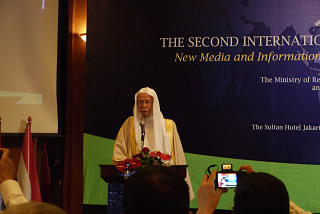 |
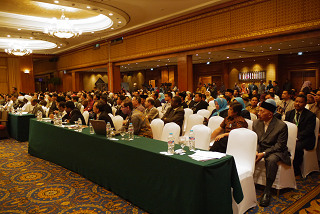 |
| アットルキー事務局長のスピーチ |
スピーチに聞き入る参加者。 |
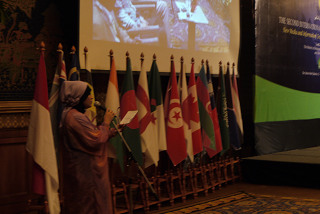 |
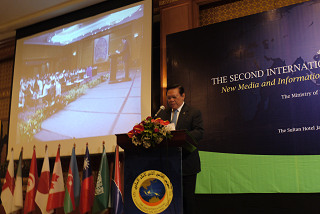 |
| 本日の司会を務めたインドネシア人女史。 |
閉会の辞を述べるインドネシア宗教大臣 |
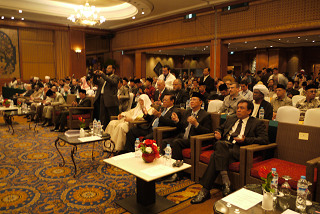 |
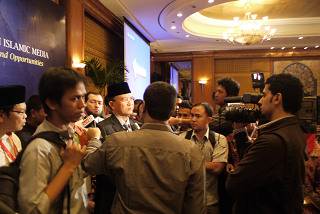 |
| ドアーを行う参加者。中央にはトルキー事務局長とスリャダルマ宗教大臣。 |
閉会後、インドネシア政府要人に殺到するカメラ。 |
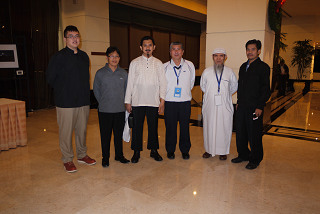 |
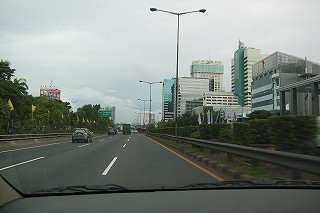 |
| 参加者の中には広尾のアラブ・イスラム学院で教員をやっていたザイトン先生(インドネシア人、左から3人目)が居た。ウラマー協議会のメンバーとして現在は母国で活躍中だ。左端は台湾の青年・趙永寧(Anas
Chao)君。途中から食事時はいつも一緒に居た。 |
12月16日朝、空港へ向かう高速道路。ここに渋滞はなかった。 |
|
|
12月16日・17日と一泊二日の予定で、クアラルンプルに寄った。
目的はマスジド・ネガラ(国立マスジド)での観光ガイドと、新入信者用に開かれているPerkimのイスラム教室の下見であった。17日昼には、一緒にマスジドネガラで観光ガイドを行ったクアラルンプル在住のムスリマたちと一緒に食事をして、マレーシアの状況など聞いた。 |
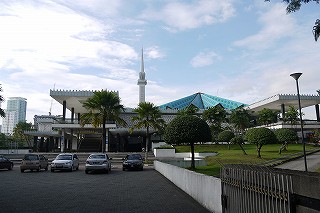 |
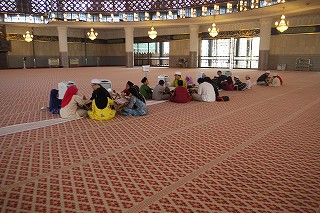 |
| マスジドネガラ全景。ここから撮影すると、きれいにファインダー内に収まる。 |
土曜日は、子供たちのためのコーラン読み学習が開かれていた。 |
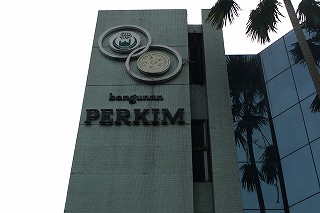 |
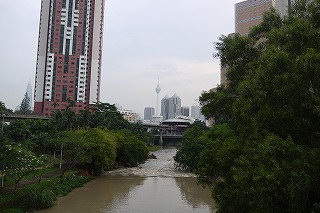 |
| Perkimビル。ここで毎日新入信者向けイスラム教室は開かれている。 |
PERKIMビル側からPWTC駅を撮影。このところクアラルンプルは雨量が多く、川の水が溢れんばかりだ。 |
|
|
|
|
|
|
|
| << 1 | 2 >> |
| |
|
|
|